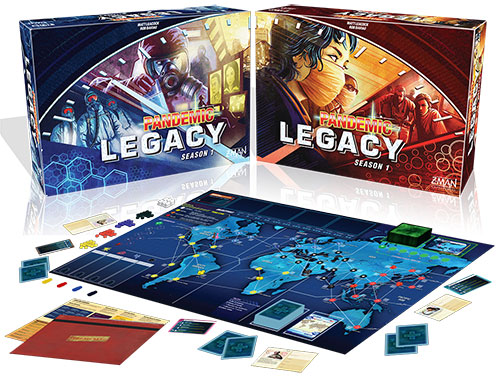PORTFOLIO SAMPLE
Game-Based-Learning Podcast
Challenge
Although gamification and game-based learning are already popular topics, a colleague and I wanted to explore the research and evidence behind them.
Solution
Top: Pandemic Legacy. Bottom: Orwell.
We chose a 30-60 minute podcast format for our discussion. To prepare for each episode we would generally pick a commercial video game or board game, select an instructional design or user experience principle illustrated by the game, and research the principle in textbooks, magazine articles, and scientific journals. We felt it important to discuss commercial games (which people buy and play voluntarily) rather than educational games (which people play when required at work or school), since the former had proven their ability to engage and train users by being successful in the marketplace.
For example, one of our episodes examined cooperative learning in the popular Pandemic Legacy board game. In this game, players act as scientists and first-responders stopping a global outbreak of disease. To win, they must plan tactics, exchange resources, and coordinate movements. The same group must play the game at least 12 times to complete the overall “campaign.” My colleague and I examined this game in light of an article from Educational Psychology Review titled “The State of Cooperative Learning,” which explained five elements of a successful cooperative learning experience: positive interdependence, individual accountability, promotive interaction, social skills, and group processing. We found that Pandemic had traces of all five elements, but that some—such as individual accountability—were used more effectively in other cooperative board games such as Archipelago and Dead of Winter.
We continued the series for 26 episodes, eventually shifting toward games that encouraged discussion about modern events, such as This War of Mine and Orwell. I created the series logo and edited each episode in Audacity, while my colleague posted the final cut on Soundcloud. You can find the series’ archive on Player FM.
Reflection
This project was my first attempt at podcasting, and my colleague and I used our initial episodes to experiment with the format. I later realized that we should have done that experimentation before publishing our first episode, since we received a relatively large number of listeners that never came back. Overall, I was happy with the content we produced, but we should have allocated just as much time and thought to gaining and engaging listeners, instead of expecting the content to do all of the work on its own.


